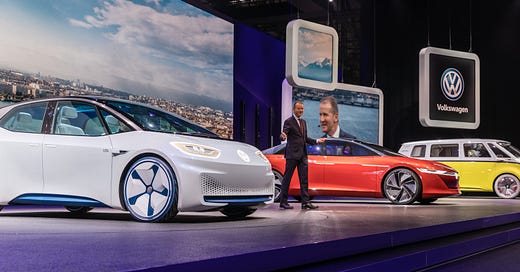Happy New Year! And welcome to Planet Days, a five-minute roundup of the latest climate news and what it means for our Planet. If this was forwarded to you, smash that subscribe button:
Last week, flash flooding devastated southern Iraq, Europe plunged further into its energy crisis, and the United States became the leading exporter of liquified natural gas.
In case you missed it, here’s what else happened around the Planet:

Sunday, January 2
Floods hit Malaysia, Indonesia
The New Year rang in with a bout of extreme weather for much of Southeast Asia. In Indonesia, torrential rain led to flooding and landslides that displaced more than 30,000 people, reports Al Jazeera.
In Malaysia, flooding affected seven states, with thousands more forced to evacuate. Over the last two weeks, the country has seen over 125,000 evacuations caused by flooding, reports Reuters. Both countries are amid their months-long rainy season, but lately, rainfall has been worse than ever.
Tuesday, January 4
Build Back Better back on the table
When Sen. Joe Manchin withdrew support for the Build Back Better Act last month, President Joe Biden’s signature climate bill looked all but dead. But this week, the centrist Democrat from West Virginia gave climate hawks hope again.
“The climate thing is one that we probably can come to an agreement much easier than anything else,” Manchin told reporters Tuesday. “There’s a lot of good things in there.”
But Manchin also said that negotiations were currently stalled. If Democrats have any hope for the package — and its $555 billion in climate provisions — they will have to conform to Manchin’s wishes and do so quickly: Democrats are likely to lose control of Congress in November. Volts has more.

Wednesday, January 5
Electric vehicle boom
Is 2022 the year of the electric vehicle? Some of the world’s biggest car manufacturers seem to think so. Last week…
Ford said it’s working to double production of its electric F-150 Lightning, available as early as this spring, to keep up with demand.
General Motors revealed its electric Chevrolet Silverado pickup, as well as two electric SUVs, expected to hit dealerships by 2023.
Volkswagen and Toyota laid out plans to spend $170 billion to help transition battery-powered vehicles.
Chrysler announced plans to go all-electric by 2028.
The moves come as Tesla punctuated another record year: The all-electric vehicle company, valued at over $1 trillion, delivered almost 1 million cars last year, nearly doubling its previous year’s numbers. Axios dives deeper.
Arctic lightning boom
A different kind of lightning is painting the skies of the Arctic. In 2021, the region saw nearly 7,300 lightning strikes — almost twice as many as the previous nine years combined.
Lightning signifies warming temperatures, as lightning requires an unstable atmosphere and warm, moist air. Climate scientists see this as a warning sign for the rest of the Planet.
"When you're having these drastic changes, especially in places like the Arctic, those sorts of changes are not just impacting the Arctic,” Chris Vagasky, a meteorologist involved in the study, told CNN. “The Earth is totally interconnected."
Fossil fuel firms dominate Google ads
A number of fossil fuel companies and their funders are among the biggest spenders on ads designed to look like Google search results, according to a new analysis by The Guardian.
Researchers looked at ads on Google searches for 78 climate-related terms, finding ExxonMobil, Shell, Aramco, McKinsey, and Goldman Sachs were among the top-20 advertisers. Campaigners criticize the search engine’s willingness to sell these ads.
“Damaging greenwashing has become endemic — to stamp it out we need to legislate bans on all fossil fuel advertisements, just like what happened with tobacco,” Johnny White, a lawyer at environmental charity ClientEarth, told The Guardian.
America’s wild weather… again
2022 is picking up where 2021 left off: With extreme weather slamming the U.S.
More tornadoes prompted Kentucky’s governor to declare a state of emergency. Snow and ice blanketed the Midwest and East Coast (one stretch of Virginia’s I-95 stranded drivers for more than 24 hours). And Colorado continued to recover from record wildfires that damaged or destroyed over 1,000 buildings.
The week serves as a reminder that climate impacts affect all parts of the country. A new Washington Post analysis found that more than 40% of Americans live in a county that was hit by climate-related extreme weather last year, with 80% of counties experiencing a heatwave.
Air pollution’s deadly impact
New research suggests 86% of urban residents worldwide are exposed to unsafe air pollution — a phenomenon that contributed to 1.8 million excess deaths in 2019. We’ve known the elevated heart and lung risks of unhealthy exposure to PM2.5, the small particulate matter polluting the air, but these new findings broaden the scale.
Another study found nitrogen dioxide gas, an air pollutant primarily emitted by vehicles, power plants, and industrial manufacturing, caused an estimated 1.85 million new pediatric asthma cases around the world. The Hill has the full story.
Bonus
Seaweed > plastic
A London-based startup, Notpla, is looking to make a big splash in the plastic pollution scene. Its current offerings — including seaweed-based packaging for water, alcohol, condiments, and takeaway boxes — are meant to fully compost or dissolve after use, with some actually being edible. But why seaweed?
“It's getting more and more clear how big the plastic problem is,” Notpla’s design director Karlijn Sibbel told CNN. “Seaweed doesn't use land; it doesn't use pesticides. It can grow into the ocean and the sea, where it actually has a lot of positive benefits so it can create new ecosystems for other organisms to thrive in.”
Have a great week,
Brandon and Sam






